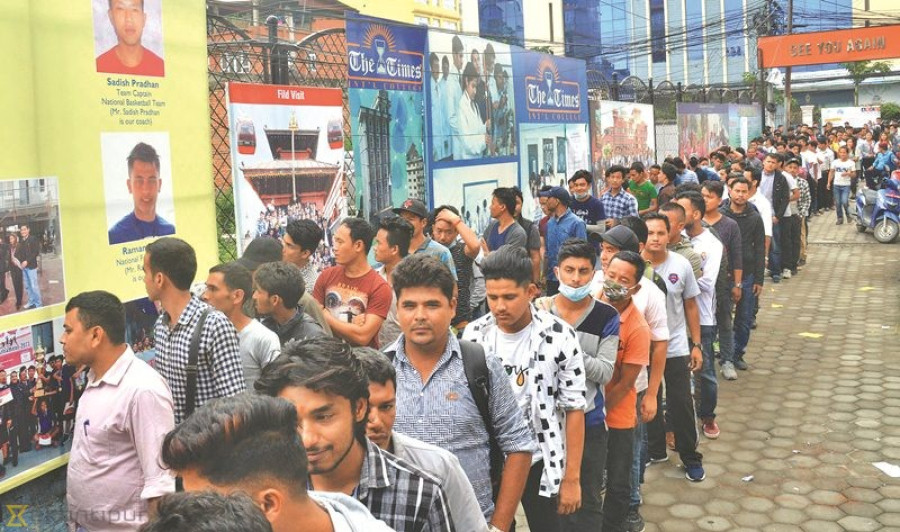National
Scheme to ensure at least 100 days of jobs for unemployed on cards
The government is rolling out a scheme that will guarantee minimum days of employment for citizens in a move that aims to deal with unemployment and discourage labour migration from the country.
Chandan Kumar Mandal
The government is rolling out a scheme that will guarantee minimum days of employment for citizens in a move that aims to deal with unemployment and discourage labour migration from the country.
The country is battling a massive outflow of productive-age population, especially to the Gulf countries and Malaysia, as nearly 1,500 men and women fly abroad every day in search of jobs.
According to a 2018 report of the World Bank, 32 percent of Nepal’s working-age population—people aged 15 to 64—was either unemployed or voluntarily inactive. The report said the country needed to create at least 286,900 jobs per year to keep this employment rate intact.
The Prime Minister Employment Programme, which is set to be unveiled this week, will ensure a minimum of 100 days of job opportunity for people from the working age at their own local level.
The Ministry of Labour, Employment and Social Security, which will implement the scheme, has identified 13 sectors, including national pride projects, where unemployed youths will be working as part of the scheme.
According to Prakash Dahal, joint-secretary at the ministry, the local level will employ unemployed youths in various sectors like agriculture and animal husbandry, forest and environment, tourism promotion, community infrastructure building, and reconstruction, among others.
“The scheme has been brought with an aim to uphold the people’s constitutional right to employment. The larger aim of this programme is also to create enough employment opportunities at home in the next five years so that no one is compelled to go abroad for work,” said Dahal, who heads the programme under the Labour Ministry.
In order to secure minimum days of work, a candidate will have to first register at the Employment Service Centre (ESC), which will be established in all the 753 local units. The Employment Coordinators to be deployed at all the centres will keep records of the unemployed population at their units.
Such records of unemployed population and available jobs at the local level will be maintained at the Employment Management Information System, said Dahal.
The system will soon work as the database for providing real time information on the number of unemployed population.
“Once the person is registered at the centre, s/he will be provided a minimum of 100 days of income opportunities in one fiscal year. They will be working at government projects at their local level,” Dahal added.
Under the programme, which aims to generate a minimum of 100,000 jobs in the country annually, will also provide sustenance allowance if it fails to provide minimum promised days of work to registered candidates, said officials.
While more than one members of the working age from a family can sign up to the scheme, only one member of a family would be receiving sustenance allowance equivalent to 50 percent remuneration of 100 working days as per the basic wage.
“This is not a programme to distribute allowance. It’s a scheme that purely aims to create jobs inside the country and encourage population of the productive age to stay in the country,” said Minister for Labour, Employment and Social Security Gokarna Bista.
Besides absorbing the labour force in government projects and works, registered unemployed youths could be sent to the private sector.
Also, the government will impart vocational training to youths at their local level. “On the one hand, we have been sending tens of thousands of workers outside. On the other, we are facing a shortage of workers for our own projects… just as our fertile land remains barren. We need to overcome this situation,” said the minister.
Prime Minister KP Sharma Oli is scheduled to unveil the programme on Wednesday. Registrations for the scheme will begin on March 15.
Possible areas of employment
- Agriculture, cooperatives and animal husbandry
- Energy, irrigation and river training
- Drinking water and sanitation
- Forest and environment
- Tourism promotion
- Road transport
- Education, youth and sports
- Reconstruction
- Community infrastructure construction
- Large and national pride projects
- Information and communication technology
- Industry
- Health




 9.51°C Kathmandu
9.51°C Kathmandu














